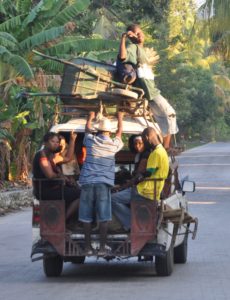Kidnapping in Haiti has doubled from last year’s numbers, and those numbers quadrupled from the year before that. Haiti has a history of periodic spikes in gang violence, but the significant rise in kidnappings is new. Kidnappings were once only a concern for those with means, but now no one is immune from becoming victims. The abduction and slaying of Evelyne Sincère, a poor high school student, brought national attention to the poor’s inability to fight back. Because Evelyn’s family could not raise funds for ransom, Evelyn’s small lifeless body was found by her sister, stuffed inside a metal container.

In response to this kidnapping, Haiti’s President, Jovenel Moïse, stated that the prime minister is chairing an anti-kidnapping task force. But many Haitians remain skeptical of the government’s sincerity in addressing the issue. Students have rallied in protests in the streets, demanding that the government do something, with some protestors suggesting overthrowing the government.
There is no consensus on who is responsible for the kidnappings or how to prevent them. In a country where 60% of the population lives in poverty, all agree that the motivation is money and survival.
How have these kidnappings impacted PieH’s work and our students? PieH’s students attend several different schools. Some schools closed temporarily, others stayed open, requesting that students not wear their school uniforms. There is no form of public transportation in Haiti. Many students ride in the back of a packed pickup truck, called a “tap tap,” for two or more hours to get to school. (Trucks converted to buses serve as the primary mode of transportation in Haiti. People Hop-on and tap the side of the truck or the roof when they want to get off. They pay a small fee for the ride.)

Riding in an open vehicle makes anyone an easy target for kidnapping. Some parents have opted to keep their children home.

One of our students, Manaika, attends a school in the densely populated city Croix–des–Bouquets where there was a recent breakout of prisoners from a nearby prison. Out of fear for her daughter, Eleana, Manaika’s mom, keeps Manaika home, trying to find a school closer to their home.
It’s hard to tell what the kidnappings’ long-term effects will have on the students, but they have a better chance than many. PieH Program Assistant Edome Orvilous stays in contact with the students and school administrators. He encourages as much normalcy in learning as possible. He is an advocate for the students, and this has a significant impact on their success.
We lift our Haitian brothers and sisters in prayer as they face another obstacle in their quest to survive, learn, and attempt to make their country a safer and healthier place to live.
Our mainstream news coverage rarely mentions Haiti, so to stay updated with its current events, I subscribe to the “Haitian Times” and the “Miami Herald.” Both are excellent sources for Haitian news, and they are the resources used for this article. ~ Debra Buzard

The living conditions are something that we in the United States – at least where I live – cannot even imagine. Prayers for our sisters in Haiti. Thank you for bringing awareness and help to the people, touching individual lives will make a difference.